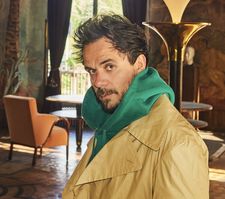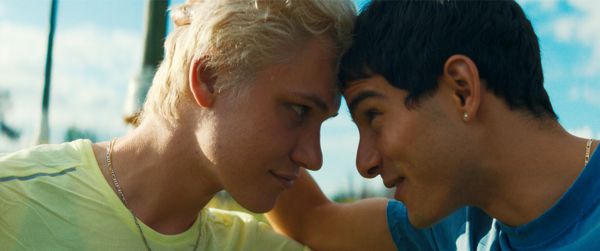Antoine Chevrollier's debut feature Block Pass follows on the heels of a strong run in television for the writer/director, who created Oussekine - which considers the events that led to the death of a French-Algerian student at the hands of police - and helmed episodes of Baron Noir and The Bureau. Block Pass (La Pampa) focuses on the friendship between teenagers Willy (Sayyid El Alami) and Jojo (Amaury Foucher). Both have bonded over motocross, racing at a track founded by their fathers. Although Willy is still reeling from the death of his ten years afterwards, while Jojo comes under increasing pressure from his (Damien Bouchard). Chevrollier's film offers racing thrills and spills while also zeroing in on toxic masculinity, small-town prejudice and the pressure to conform to parental expectations. Block Pass had its premiere in Critics' Week in Cannes, and we caught up with Chevrollier this week to talk about writing what you kow and getting your message across.
You’ve previously been involved with TV shows, were there any challenges or unexpected joys from making a film rather than something for television?
AC: Actually, it’s the same movement for me. I mean, of course, when I was young, I wanted to do features but life goes on and I began with the TV shows. When I direct a TV series, I think in the same way as when I'm directing a feature, but of course, a first feature is still a first feature, you don't have a second first feature. So it's a particular joy.
In terms of the film’s themes, on the one hand, it's a celebration of male friendship and camaraderie. But on the other hand, you're also addressing this kind of toxic masculinity that can exist in that kind of environment . How tricky was it for you to maintain the balance between those two opposing forces?
 |
| Antoine Chevrollier: 'To move the mindset of the people, you’ve got to be a little bit on their side' Photo: Raphael Lugassy |
I come from this neighbourhood. I love those people but I hate them. It's like family, like your mother or father. When you are far from them, you miss them, but when you are close to them, you want to go far away. That's really my family, my people, my territory. I love them. But it's because I love them, I get to be fair. I get to look them deeply in the eyes and say, “You act badly but you’ve got love. You’ve got lots of good things, but you act badly”.
You captured that sense of risk taking that young men, in particular, often have. Were you a risk taker when you were young?
AC: Yes, I was this kind of a young boy, but I was really attracted by this masculinity. And when I was younger, I didn't know it was toxic. I was attracted not not by the sports, but subconsciously, it was something about the attitude of those men, you know, testosterone, virility, this kind of thing. But then when I became an adult, I just rebuilt my mind and said, “Okay, I was so oppressed”. To tell you the truth, I don't really love men. I think they are. They are cowards. I don't really like the way they act. That’s a massive opinion and there are some exceptions, of course. It gave me a subject for my movie. Toxic masculinity kills people. It killed a friend of mine when I was young, it kills in the movie, and, more than that, it kills even the perspective of being somebody different. We’re talking about the violence of the collective in the face of individual singularity.
There really is that sense of the individual coming up against the collective not just in the world of the youngsters, but in terms of the youngsters and the adults and what the adults are expecting the kids to do. Your film shows how difficult it can be to break free from that.
AC: You're totally right. It's exactly that. And nothing’s changed. Like 25 years ago, it was like that and it's still the same thing now.
Turning to the look of the film, the colour scheme is very bright and alive, it mirrors the way that emotions and everything else are amplified when you’re a teenager. Everything seems bigger.
AC: The idea at the beginning was that when you lose somebody really close, when you are a child or when you are an adult, everybody takes care of you. But when you are a teenager, the fact you are in this bubble. The teenage loss is not really considered. Everything is violent, everything is hard at this age. When I was young, I lost a really close friend and nobody gave a shit because I was a teenager. And if I was like six years old, or 22 years old, everybody was like, I think they would have been around me showing they cared. So there is something really violent in a way. You are in this bubble, where everything is like, okay, for the rest of the world, even the most violent things. I want to dig this question of violence inside of them. But also outside.
In terms of the shoot itself, how tricky was it to capture the motocross, to get your cameras in exactly the right place and work with stunt riders?
AC: It was quite complicated because we shot a real race. It was also complicated because of the way I wanted to shoot it. We have two races in the movie, the first one with Jojo and the second one with Willy. I really wanted to singularise the two races. The first one was to understand the violence and the speed and be more like an audience. With the second one, for me, it was important to be deep in the race from Willy’s point of view.
 |
| Amaury Foucher and Sayyid El Alami in Block Pass. Antoine Chevrollier: 'I want to dig this question of violence inside of them. But also outside' |
It was really important to shoot differently; really complicated because the logistics and everything around the race are really complicated. To put a camera on the chest of a real driver in a real race was really complicated. But we did it. To tell you the truth, when we shot the real race, I didn't know how I was going to edit that because it was really a mess, except for the long shot of Willy’s point of view on the last race, I knew from the beginning I wanted to do that and I knew how to edit it.
Did your actors have to learn to do some motocross as part of this?
AC: Not motocross but for Amaury Foucher had never been on a motorbike before. So it took two or three months with somebody to learn how to be comfortable, it was really tricky because at one stage they’re driving without a helmet. Sayyid El Alami had his licence so that was okay.
Tell me a bit about the casting.
AC: I like to mix non-professional and professional actors. I think everybody pushes up everybody else. The nonprofessional can push up, because they're going to be like, like a mess, so you have to react with this mess. You know what I mean? And the professional can give the non-professionals some technicity.
Going forward, are you planning more features, more television series, or both?
AC: I’m going to do both, because I love both. For example, right now, I have two features, but I’m also writing two series. I don’t know which will start but I work with three or four screenwriters around me..
Do you think you’ll keep going with male-driven stories, given that you’ve said you don't like men very much? Do you fancy having a go at a female-oriented story?
AC: I would love to, but I'm not sure I will know exactly the female point of view. If I get to do that I’d have to be surrounded by women who would tell me how things are. I’m really humble in this area. I talk about what I know and I show what I know. But I really would love to show how women are strong and different. I have one series with a female point of view but I’m working with three co-writers who are female.





















